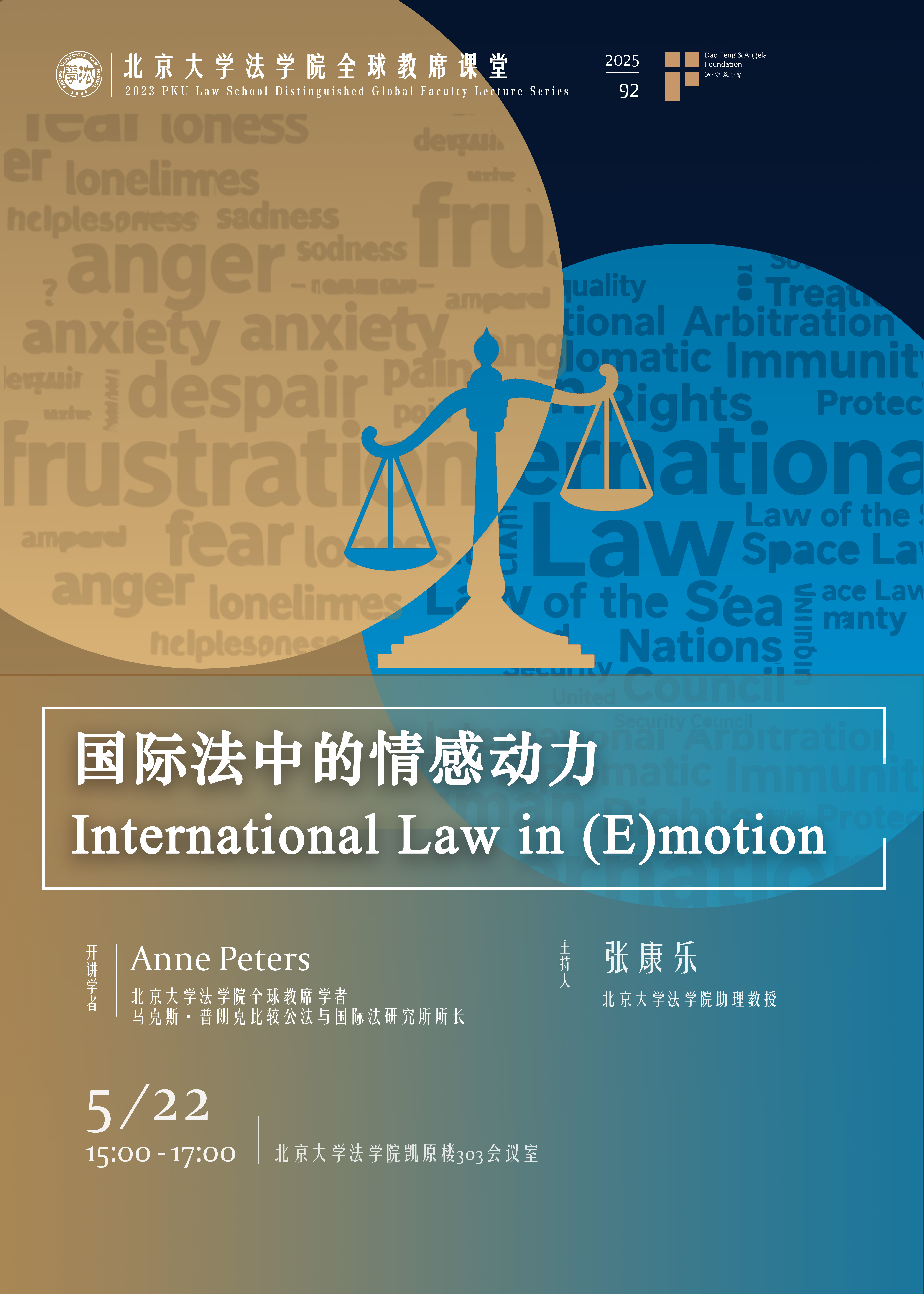
题目: 国际法中的情感动力 International Law in (E)motion
时间: 5月22日(周四)15:00-17:00
地点: 北京大学法学院凯原楼303会议室
主讲人: Anne Peters 裴德安 德国马克斯·普朗克比较公法与国际法研究所所长
主持人: 张康乐 北京大学法学院助理教授
与谈人: 季华 外交学院国际法系副教授
刘洋 中国人民大学法学院助理教授
赵理智 北京外国语大学法学院助理教授
曹文姣 外交学院国际法系讲师
陈晓航 北京大学法学院助理教授
林兆然 北京大学海洋研究院博士后
主讲学者简介
Anne Peters 教授为德国马克斯·普朗克比较公法与国际法研究所所长(2013 年 3 月 1 日起任),兼任德国海德堡大学法学院教授、弗赖堡大学法学院教授、瑞士巴塞尔大学法学院教授、美国密歇根大学 L. Bates Lea 全球法学教授。她是欧洲国际公法学术研究的领军人物之一,主要研究方向包括国际公法、欧洲宪法、比较宪法、国际人权法等。
Peters 教授先后求学于德国维尔茨堡大学、瑞士洛桑大学、德国弗赖堡大学(1994 年获得德国弗赖堡大学法学博士学位)、美国哈佛大学(1995 年获得美国哈佛大学法学硕士学位)。她曾任格鲁吉亚冲突问题国际实况调查团法律专家(2009 年)、欧洲国际法学会会长(2010 年-2012 年)、欧洲理事会“通过法律实现民主”威尼斯委员会德国代表(2011 年-2015 年)等,并曾在德国宪法学会和国际宪法学会等多个学术团体的管理委员会任职。
Peters 教授目前担任德国联邦外交部国际法委员会成员、国际法协会使用武力委员会成员、德国国际法学会会长和巴塞尔治理研究所董事会副会长。
Peters 教授具有丰富的法律实务经验和深厚的学术理论功底,所著的《国际法史手册》曾于 2014 年获美国国际法学会图书奖。多年来,她受邀赴世界各地知名大学访问、讲学,也曾多次到访北京大学。她丰富的学识和精彩的讲授得到师生的广泛赞誉。Peters 教授目前的研究兴趣涉及国际公法的各个方面,包括其历史、全球动物法、全球治理以及人类在国际法中的地位。
Anne Peters is Director at the Max Planck Institute for Comparative Public Law and International Law Heidelberg (Germany), and a professor at the universities of Heidelberg, Freie Universität Berlin, Basel (Switzerland), and a L. Bates Lea Global Law professor at the Law School of the University of Michigan.
She was a member (substitute) of the European Commission for Democracy through Law (Venice Commission) in respect of Germany (2011-2015) and a legal expert for the Independent International Fact-Finding Mission on the Conflict in Georgia (2009). She was the President of the European Society of International Law (2010-2012), has served on the governance board of various learned societies such as the German Association of Constitutional Law (VDStRL) and the Society of International Constitutional Law (I CON-S), and she is currently President of the German Society of International Law (DGIR) as well as the Vice-President of the board of the Basel Institute of Governance (BIG).
Anne was a fellow at the Wissenschaftskolleg in Berlin, and held visiting professorships at the universities of Beijing (Beida), Paris I, Paris II, and Sciences Po. Born in Berlin in 1964, Anne studied at the universities of Würzburg, Lausanne, Freiburg, and Harvard, and held the chair of public international law at the university of Basel from 2001 to 2013. She obtained the Habilitation-qualification at the Walther-Schücking-Institute of Public International Law at the Christian Albrechts University Kiel on the basis of her Habilitation-Thesis “Elemente einer Theorie der Verfassung Europas” (Elements of a Theory of the Constitution of Europe) in 2000.
Her current research interests relate to public international law including its history, global animal law, global governance and the status of humans in international law.
讲座摘要
公民、领导人、立法者与法律适用者的情感如何影响国际法的进程?国际法及其适用又如何塑造人类的情感?情感是一个难以界定的概念,不同学科对其理解各异,且常与"情动"(affects)、"感受"(feelings)、"情绪"(sentiments)等概念交叉重叠。其范畴涵盖恐惧、愤怒、仇恨、愤懑、羞耻、厌恶、爱、同情、共情等诸多维度。近年来,社会科学开始吸收人类学、个体与社会心理学、精神医学及神经科学的研究成果,从历史学、社会学、行为经济学及国际关系学等视角探讨情感的作用机制。情感既可能成为人类立法者、法律适用者(包括司法机构)及执法者的行为驱动力,也可能构成其自我约束的动因。然而,传统法律观将法律视为"成文理性"(ratio scripta),这种理念导致表面上"非理性"的情感因素长期被忽视。当前,国际法学者亟需探究个体与集体情感在当今国际法律秩序转型(尤其是其部分颠覆性趋势)中的作用。值得关注的议题包括民粹主义/民族主义、和平与战争、自然/资源攫取等。在此过程中,情感的文化间性特质及"情感去殖民化"的潜在必要性尤为重要。我们能否识别普遍性情感作为普世规范的基础?又能否量度并引导情感的力量,使其在法律层面导向和平、人类繁荣及与自然和谐共生的目标?
How do emotions (of citizens, leaders, law-makers, and law-appliers) influence the processes of international law? And how does international law and its application contribute to the shaping of emotions? Emotions are a fuzzy concept, understood differently in various disciplines, and overlap with concepts such as “affects”, “feelings”, and “sentiments”. They comprise fear, anger, hate, resentment, shame, disgust, love, compassion, empathy, to name a few. Social sciences have recently begun to digest findings of anthropology, individual and social psychology, psychiatry, and neurosciences, and have studied emotions in history, in sociology, in behavioural economics, and in international relations. We should expect emotions to contribute both to the motivation and to the control of human law-makers, law-appliers, including the judiciary, and law enforcement. But the traditional idea of law as embodied reason (ratio scripta) had contributed to the neglect of ostensibly “irrational” factors. It is now time that international lawyers investigate the role of individual and collective emotions in the ongoing, partly disruptive transformation of the international legal order. Themes of special interest are populism/nationalism; peace and war; and nature/extraction. In all this, the inter-cultural aspect of emotions and the putative need for “de-colonising emotions” seems relevant. Can we identify universal emotions as a basis for universal norms? And can we measure and harness the power of emotions to generate legal outcomes in the direction of peace, human flourishing, and harmony with nature?
